In Sofia, EU Closed the Door to Enlargement but Left Money and Instructions
Adelina Marini, May 28, 2018
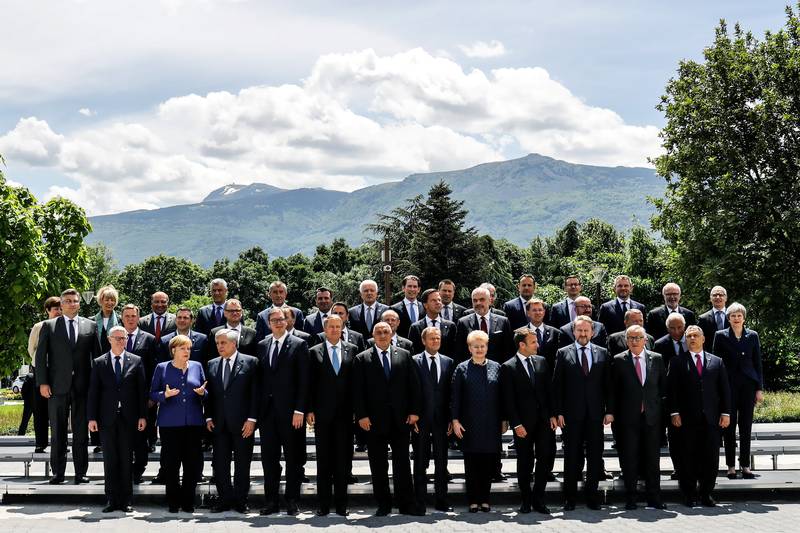 Some say that the EU-Western Balkans summit was a historic one. Others say it was successful. Without necessarily both claims to be false, their validity is wrong. It is explained that the summit was historic because it was the first in 15 years. The last summit with the Western Balkans (in the shape they had back then) was in 2003, in Thessalonнki. It is also said that the Sofia summit was successful just because it took place. This would have been true if during those 15 years there were unsurmountable or difficult to surmount obstacles, like, for example, an impossibility to make the six leaders sit at one table together. However, they sit quite often together in various format - from the Berlin process summits, as part of the Brdo-Brijuni process, in the framework of the South-East European Cooperation Process, and many other initiatives, processes and formats.
Some say that the EU-Western Balkans summit was a historic one. Others say it was successful. Without necessarily both claims to be false, their validity is wrong. It is explained that the summit was historic because it was the first in 15 years. The last summit with the Western Balkans (in the shape they had back then) was in 2003, in Thessalonнki. It is also said that the Sofia summit was successful just because it took place. This would have been true if during those 15 years there were unsurmountable or difficult to surmount obstacles, like, for example, an impossibility to make the six leaders sit at one table together. However, they sit quite often together in various format - from the Berlin process summits, as part of the Brdo-Brijuni process, in the framework of the South-East European Cooperation Process, and many other initiatives, processes and formats.
The only reason why there has been no EU-Western Balkans summit since Thessalonнki is neglect and underestimation of the situation in the region. After all, the EU meets much more frequently, and regularly, with the Eastern Partnership countries. It's a shame it does not meet on a regular basis with countries which are expected to be part of the Union one day. Brussels thought for quite some time that its accession criteria are completely enough to do the trick and waited for years those countries to fulfil them without doing a thing, despite that the region was sinking into authoritarianism, nationalism, xenophobia and ethnic tensions right before its eyes. The region's temperature has been rising to such an extent that newspapers in the six countries often than not offered titles where the word 'war' was present. Sometimes with a question mark and sometimes without. The Union realised its mistake for the first time when the situation was about to go out of control.
EU High Representative for Foreign and Security Policy Federica Mogherini (Italy, S&D) did not hide her surprise during her tour in the region in the winter of 2017 that these countries were farther than ever from their European future. If she came a bit later the Union could have let Macedonia shrink into an ethnic conflict. After seeing the region's condition with her own eyes she vowed that she would no longer let her eyes off of it. The first significant step was the adoption of a strategy for the region, and the second was the summit in Sofia, preceded by a series of high-level visits - from European Commission President Jean-Claude Juncker (Luxembourg, EPP) to European Council President Donald Tusk (Poland, EPP), in addition to bilateral meetings with individual member states.
Despite the wrong validity, there is truth in the claim that it was a historic summit because it marked the beginning of a significant change in the enlargement policy. Enlargement is no longer taken for granted nor is it a bureaucratic and a one-way process. The enlargement policy is evolving into a full-fledged common foreign policy that is directly linked to the internal processes in the Union. This means that it is no longer isolated from what is happening in the EU itself and is adapting to it, which leads to upgrading criteria and re-arrangement of priorities.
Macron has put an end to Merkel's policy
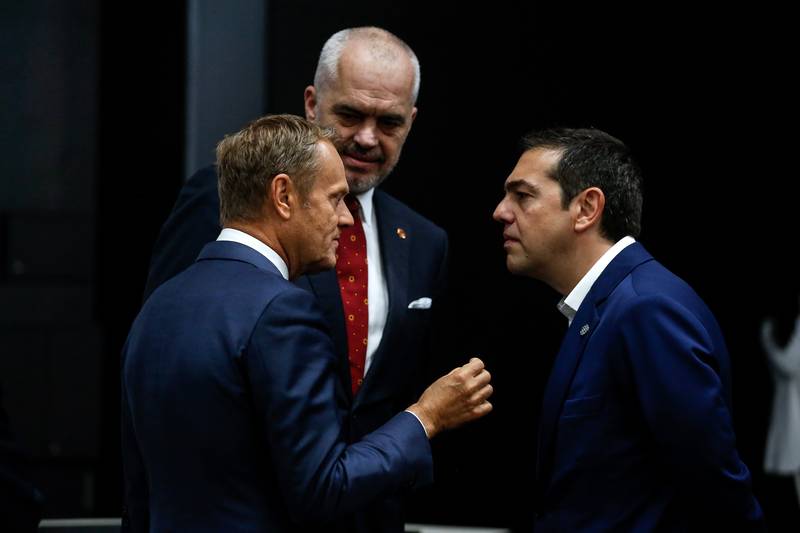 Strong wind in the sales of the re-orientation of the enlargement policy came from Paris with the election of Emmanuel Macron for president of France. He put the EU reform first. When on April 17, in Strasbourg, he said that there would be no new enlargement unless the Union is reformed, his words were not taken completely seriously. A month later, however, in the declaration from the Sofia summit his handwriting can be seen all over the document. Moreover, after the end of the several-hours long summit, the French president reiterated that a Union of 27 or 28 member states is not capable of taking crucial decisions unless it is under pressure by a crisis. Besides, the European perspective should be given to countries whose leaders implement real reforms. "Today, we cannot open up new negotiations without any pre-condition and the European Commission is pointing out the fight against corruption, migration issues, which still need improvement before we can open new negotiations for the purpose of joining the EU", the French president said on May 17 in Sofia.
Strong wind in the sales of the re-orientation of the enlargement policy came from Paris with the election of Emmanuel Macron for president of France. He put the EU reform first. When on April 17, in Strasbourg, he said that there would be no new enlargement unless the Union is reformed, his words were not taken completely seriously. A month later, however, in the declaration from the Sofia summit his handwriting can be seen all over the document. Moreover, after the end of the several-hours long summit, the French president reiterated that a Union of 27 or 28 member states is not capable of taking crucial decisions unless it is under pressure by a crisis. Besides, the European perspective should be given to countries whose leaders implement real reforms. "Today, we cannot open up new negotiations without any pre-condition and the European Commission is pointing out the fight against corruption, migration issues, which still need improvement before we can open new negotiations for the purpose of joining the EU", the French president said on May 17 in Sofia.
Thus, Emmanuel Macron put an end to the cautious policies of German Chancellor Angela Merkel, oriented toward maintaining the status-quo. Her toleration of stabilocracies has sent the region decades back, while, in the same time, she has been giving it false hopes. Her attempts with the Berlin process to show that the region is not forgotten and is important for the EU undermined the confidence in the EU of the citizens in the six countries, many of whom think the EU betrayed them together with its broadly promoted values and ideals. In those 15 years since the previous EU-Western Balkans summit, the opposition in some of the region's countries disappeared completely as a result of systemic efforts. Media freedom is suppressed in the countries for which the EU suggested a conditional date - Montenegro and Serbia - but it is on a death bed elsewhere in the region. All countries suffer of demographic problems.
The Berlin process, focused entirely on improvement of trade, economic, transport and social links among the six countries, is perceived by many in the region as a substitute for EU membership. The fact that a leaving Britain will be hosting this year's Berlin process summit pours more oil on the fire of distrust and disappointment with the EU. Many ask the legitimate question "What kind of defence of European integration can a leaving member state offer?". As a matter of fact, it can contribute a lot because the entire process of Brexit is a textbook example of where do populism, disinformation and abuse of popular lead to. Something that is quite familiar in the Balkans.
Angela Merkel's policy in the region is part of the problem that brought the anti-systemic player Emmanuel Macron in power. The omnivorousness and high-threshold tolerance toward suppression of European values and ideals by the European Peoples' Party, which Merkel's Christian-Democratic Union (CDU) is part of, contributed a lot for the emergence of anti-systemic parties. Macron's party, however, is the first with a + sign. He is the first leader in a long time in Europe to win elections on a strongly pro-European ticket and who has a broad vision, and acts with a scale. That is why the closing of Europe's door under the noses of the Western Balkans leaders, under his influence, should be viewed as an attempt to bring enlargement policy back to the roots. As a matter of fact, Macron closed the door not only for enlargement but for Schengen and the euro area as well, but this another topic euinside is also working on.
Reaffirmation of accession criteria
With his very first appearance on European stage a year ago - at the June European Council meeting - Emanuel Macron made it clear that he would not tolerate illiberal currents and has not stopped since then to reiterate that the EU should go back to its roots. The most important parts of the Sofia declaration are as if written by him. The document can hardly be interpreted as a re-affirmation of the region's European perspective, as it is advertised. It actually aims to recall the enlargement criteria but also to add some new. The European perspective is mentioned in the declaration, but in the context of a "firm strategic choice". The selection of words is important because the Serbian leadership, for instance, 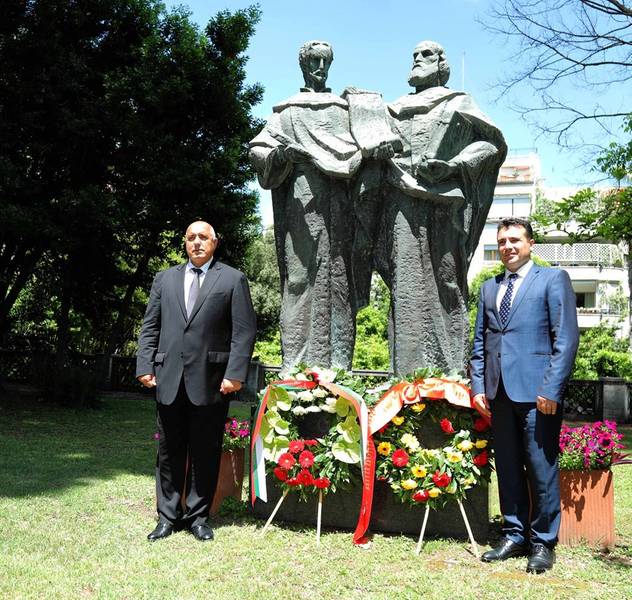 bombards the population on a daily basis with words about a European strategic choice but does nothing to show that it is real. On the contrary, it works in the opposite direction.
bombards the population on a daily basis with words about a European strategic choice but does nothing to show that it is real. On the contrary, it works in the opposite direction.
In the same time, in Macedonia, the government lacks the time to talk about strategic choices busy with work which neither of the others in the Balkan six-pack has done so far. Even their combined decades-long efforts cannot be compared with what Macedonia has achieved in just one year. Moreover, it's about work done under the "new" criteria as outlined in the Western Balkans strategy and enhanced in the Sofia Declaration from May 17th. Those are solving bilateral disputes (with Greece on the name issue of the former Yugoslav republic) and good neighbourly relations (with the signing of a friendship agreement with Bulgaria). Macedonia is also piling a track-record that its actions are not symbolic. The prime ministers of Bulgaria and Macedonia more and more often mark common national days together. The news that the former prime minister of Macedonia, Nikola Gruevski, was sentenced to two years in prison for corruption, will also raise significantly the price of Macedonia's accession efforts.
According to the declaration, the countries in the region accept that democracy and the rule of law are of primary importance and especially the fight against corruption and organised crime, good governance, respect for human rights and rights of minorities. The civil society and independent media are also pointed out as a major priority. Finding durable and binding solutions to bilateral disputes, the legacies from the past, as well as reconciliation are articulated as new accession conditions in the European Commission strategy for the Western Balkans, but are underlined in the Sofia declaration. Mr Macron's handwriting can also be recognised in the texts in the document that mention the need for the region to develop digital economy and to stick to the Paris agreement on climate change.
A new condition for accession is energy security. The Western Balkans are expected to work on improving their energy efficiency, better energy interconnections, diversification of sources and routes, and, most of all, for a balanced energy mix. The six countries are also expected to accelerate the implementation of the European energy legislation, removing of all barriers at the borders in the region, and complete the regional electricity market. All this is expected to happen before accession because all these issues have a strong geopolitical charge.
Foreign policy has long been hanging like a Damocles condition, mainly over Serbia, as it is the only country which openly plays a double game by, together with stating its European orientation, working actively to deepen relations with Russia, which is named a threat for the EU, and with Turkey, which has turned recently into a serious adversary. In the Sofia declaration, there is a special paragraph which says that the countries of the region are expected to hurry up with the alignment of their foreign policy with EU's, and especially regarding issues involving major common interests. This is a new formulation hinting not only of Russia but of all players that have interests in the Western Balkans region. And, ever since relations between the EU and the US deteriorated sharply with Washington's unilateral withdrawal of the nuclear deal with Iran, this formulation includes this geostrategic problem with the EU too.
Another novelty is that the EU insisted and the Western Balkans agreed (with their signature under the declaration) to work together in the fight against disinformation and hybrid activities. This is also aimed mainly at Serbia and its proxy in Bosnia and Herzegovina - Republika Srpska.
The EU emerged without someone forcing it. It's time the Balkans are deprived of the baby nipples
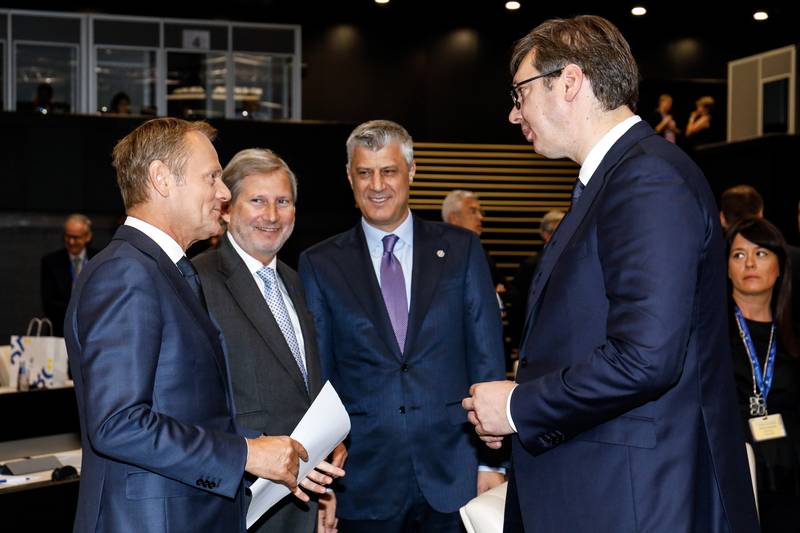 The French president is not the only one who is for a harder approach to the Western Balkans, whose immature behaviour has become a burden for everyone. European Council President Donald Tusk also took a hard line toward the countries in the region. His message, in fact, was the strongest. It was provoked by the very simplistic comparison the host, Boyko Borissov, made during the press conference in the end of the Sofia summit. The Bulgarian prime minister said that if they were a single state, the common economy of the six Western Balkan countries would be with the size of Slovakia, and a population less than Romania's. He specifically addressed the western media asking them if it is really that scary to accept these countries.
The French president is not the only one who is for a harder approach to the Western Balkans, whose immature behaviour has become a burden for everyone. European Council President Donald Tusk also took a hard line toward the countries in the region. His message, in fact, was the strongest. It was provoked by the very simplistic comparison the host, Boyko Borissov, made during the press conference in the end of the Sofia summit. The Bulgarian prime minister said that if they were a single state, the common economy of the six Western Balkan countries would be with the size of Slovakia, and a population less than Romania's. He specifically addressed the western media asking them if it is really that scary to accept these countries.
Donald Tusk, however, reminded the Bulgarian prime minister that "if we compare this region to other parts of Europe you can say that, when it comes to troubles per capita, the Western Balkans are much bigger than Germany and France together. And this is why, I think, we have to be consistent, tough, optimistic but also cautious with our promises". Tusk's words summarise everything that is wrong with the Balkans. France and Germany turned their backs to the past after the devastation of World War II and laid the foundations of today's European Union with the only purpose to prevent a repetition of the terror. The Balkans states have been failing for decades to put the past behind them and to look at their common future together. Moreover, authoritarian and populist politicians instrumentalise the past to mobilise voters.
Macron and Tusk are not the only ones whose patience with the Balkans is evaporating. Lithuania's President Dalia Grybauskaite, too, said before the summit that everyone has a chance for EU membership if they adopt the European democratic values and implement the necessary reforms. The ball now is in the Western Balkans' court, their leaders and societies. The situation looks like a stalemate because those are the same leaders that led their countries to the current situation while, in the same time, their societies are deprived of a different point of view. This means they have no idea that it could be different. In the same time, though, the EU is growingly aware that if it continues in the same vein it risks falling apart. The Union's strengthening, returning to its fundamental values and ideals, consolidating the common policies is something that has to happen as quickly as possible not only for the sake of enlargement but because the geopolitical circumstances dictate it. And enlargement is an important part of these circumstances.
The Sofia agenda
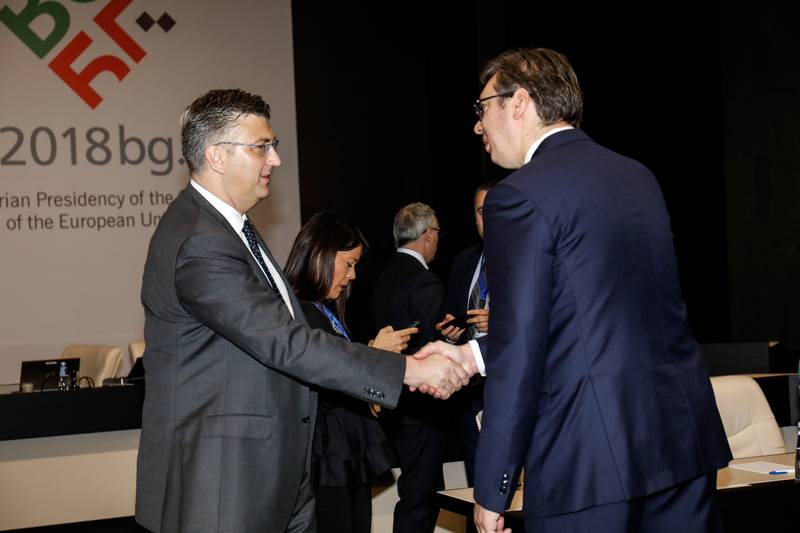 The reason why it can be said that the Sofia summit was a success was the adoption of the Sofia priority agenda. It shows that the EU will no longer be a neutral observer from the sidelines of the processes in the region but will be an active participant. The Union commits to increasing its support for building rule of law and good governance. This will happen by increasing the assistance for judicial reform and the fight against corruption and organised crime; expanding the rule of law fact-finding missions, which includes increasing support of individual member states and at Union-level. Monitoring of reforms will also be enhanced through more systematic missions which will work on a case-by-case principle. As the Western Balkans strategy envisaged, special monitoring of trials of serious corruption and organised crime will be introduced.
The reason why it can be said that the Sofia summit was a success was the adoption of the Sofia priority agenda. It shows that the EU will no longer be a neutral observer from the sidelines of the processes in the region but will be an active participant. The Union commits to increasing its support for building rule of law and good governance. This will happen by increasing the assistance for judicial reform and the fight against corruption and organised crime; expanding the rule of law fact-finding missions, which includes increasing support of individual member states and at Union-level. Monitoring of reforms will also be enhanced through more systematic missions which will work on a case-by-case principle. As the Western Balkans strategy envisaged, special monitoring of trials of serious corruption and organised crime will be introduced.
The agenda also envisages improving measurement of results in the reform of the judiciary and increasing support for building of independent and pluralistic media. It is planned to create a joint task force within the Justice and Home Affairs Council of the EU which will be coordinated by the Commission. Regarding foreign policy, it is planned to significantly expand cooperation and dialogue, including in terms of defence and security. Last but not least, as the strategy says, investments in education will be increased. The student exchange programme Erasmus+ will be doubled for the region. The EU will support the Western Balkans actively in the creation of an energy market.
June is a test for the new approach
At the EU June summit, it is expected a decision to be taken on the future of the countries in the region. The European Commission recommended opening of accession talks with Albania and Macedonia. It is very important the Union to avoid making a mistake in its assessment because that would cost all the efforts of last year, which were in any way belated. The EU must show that it has learned the lessons from its numerous mistakes in this volatile region. The only way the Union can support its words and strategy is to open negotiations with Macedonia only. Albania has a long way to go before reaching what the government in Skopje did. Putting both countries on an equal footing would be demoralising.
The EU should stop calling Serbia and Montenegro front-runners. Not only that they are not but such spoiling motivates their leaders to continue to do whatever they like, practically under the Union's wing. This is irresponsible to the citizens of these countries. In addition, the Union should be more involved with Bosnia and Herzegovina, which is a very underestimated problem. As this website proposed earlier, it is high time the Union to open and facilitate another dialogue with Serbia, this time on Bosnia and Herzegovina. Croatia should be involved in it too. A permanent solution to the inter-ethnic tensions in the country mus be found that will put an end to the play with fire by the leaders of the three  composite peoples. Bakir Izetbegovic's game with Recep Tayyip Erdogan is very dangerous and EU's silence can be interpreted either as acquiescence or weakness.
composite peoples. Bakir Izetbegovic's game with Recep Tayyip Erdogan is very dangerous and EU's silence can be interpreted either as acquiescence or weakness.
High-level visits in the region should continue and be more regular and frequent, especially in the most problematic countries. It is worrying that it was agreed at the Sofia summit the next summit with the Western Balkans to be in two years, during the Croatian EU Council presidency. This equals the region with the Eastern Partnership countries, the summits with which are also every two years but these countries do not have a European perspective. If in June leaders continue with the same rhetoric and the same approach to give everyone a little something in order to ensure peace in the flock it will be another mistake the Union will pay later with huge interest. The message from Sofia has to be enhanced in Brussels in the end of June.
 Aleksandar Vucic, Recep Tayyip Erdogan | © Serbian Presidency
Aleksandar Vucic, Recep Tayyip Erdogan | © Serbian Presidency Jean-Claude Juncker, Zoran Zaev | © European Commission
Jean-Claude Juncker, Zoran Zaev | © European Commission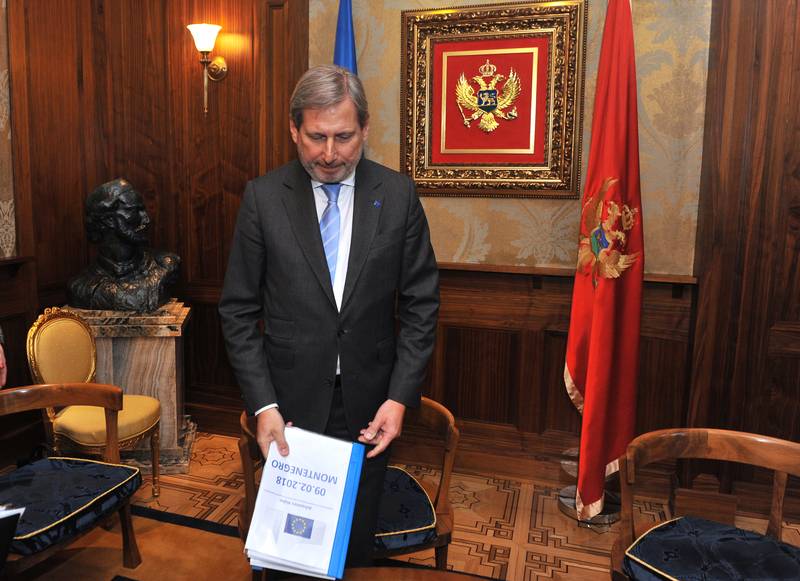 Johannes Hahn | © European Commission
Johannes Hahn | © European Commission